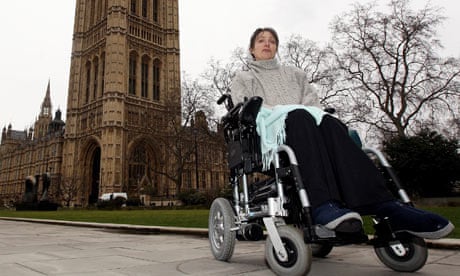The new policy for prosecutors in respect of cases of encouraging or assisting suicide, published today by the director of public prosecutions (DPP), was issued in response to last year's House of Lords ruling in favour of campaigner Debbie Purdy. The law lords required the DPP "to clarify what his position is as to the factors that he regards as relevant for and against in cases of assisted suicide". The DPP had no option but to comply with the ruling.
The consultation provoked an intense public debate, with 4,710 individuals and organisations moved to express their opinions on this deeply emotive subject. The DPP also had to take into account a Commons early day motion signed by 63 MPs calling for the interim policy to be withdrawn on grounds that it overrode the will of parliament, suggested to would-be offenders how to avoid prosecution and put the vulnerable at risk.
The DPP has now done exactly what we argued on Purdy's behalf was both possible and necessary to give clarity to her and others faced with a desperately difficult dilemma: to what extent should I involve my loved one in an assisted suicide, and will he or she be prosecuted for helping me to implement my choice?
The factors against prosecution are now focused on the victim having a voluntary, clear, settled and informed decision to commit suicide. The Suicide Act 1961 itself has been amended to extend culpability to a person who arranges for the suicide of another person, and makes it an offence for a suspect who threatens or puts pressure on the victim. These changes are intended to protect the vulnerable further and to show would-be offenders that they will be prosecuted if they attempt to exploit the vulnerable. The new policy will no doubt have its objectors, but it is difficult to see how it can possibly put people at risk where they were not before.
However, it is not quite right for the DPP to say that the case of Purdy did not change the law – clearly, it did.
Significantly, the requirement that the victim have a terminal illness, a severe, incurable physical disability or severe degenerative physical condition, as a factor weighing against prosecution has been removed – and rightly so. Arguably, the provision implied that the lives of the ill and disabled are less valuable, creating the potential for indirect discrimination against disabled people. The absence of this requirement is clearly consistent with the right of any person to end their life, whether ill, disabled or otherwise. This is also consistent with the DPP's decision in the Daniel James case (the 23-year-old rugby player, who was not terminally or incurably ill); while, for Debbie Purdy personally, as a multiple sclerosis sufferer who is incurably but not yet terminally ill, it is easy to see that the public interest factors against prosecution are clearly satisfied.
The DPP is at pains to say that the guidelines do not open the door for euthanasia or so called "mercy killings", which are quite different from assisted suicide and may result in charges of murder or manslaughter. But is this right?
One has only to look at the recent cases of Frances Inglis, Kay Gilderdale, and Ray Gosling (not yet charged) to see that, with their compassion for the suffering of a loved one, there is a very fine line between assisting a suicide and being accused of murder – yet it is one that carries devastating consequences and a possible life sentence if found guilty.
Take also, for example, the situation of a man with locked-in syndrome, who has the mental capacity to make a decision about suicide, and has a clear, settled and informed wish to commit suicide, but is physically unable to do so and needs the assistance of his family to implement that decision. Can it really be right to say that public prosecutors should not take account of public interest factors similar to those published today?
Given the new guidelines on assisted suicide, we must ask if the law of murder is too inflexible and whether we should look now at making a distinction with mercy killing.
